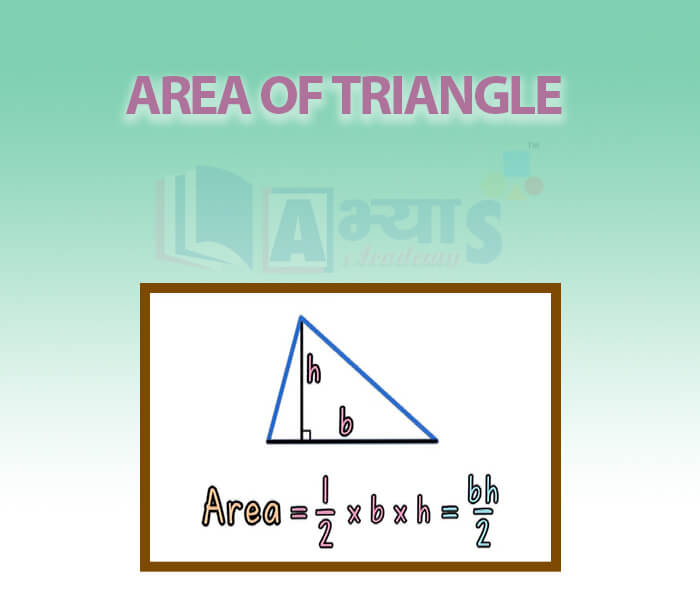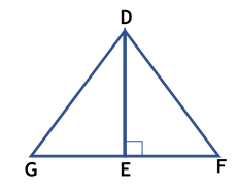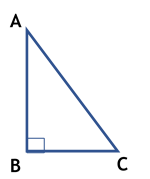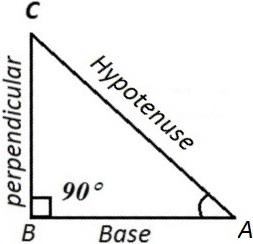Area of Triangle


Area of Triangle
Area of Triangle:
A triangle is a three sided figure. To find the area of triangle we should know the base and the corresponding height of the triangle. The formula is
In the figure given below

The area of triangle DGF can be calculated as
Here DE is perpendicular to the base GF. So we can say that DE is the corresponding height to the base GF.
Illustration: Area of a triangle is 54.The height of triangle is 6 cm. Calculate the base of triangle.
Solution: According to question
Area of triangle=54
Height=6cm
To calculate the base we will use the formula
Area of Right Triangle:
A right triangle is the one in which the measure of any one of the interior angles is 90 degrees. It is to be noted here that since the sum of interior angles in a triangle is 180 degrees, only 1 of the 3 angles can be a right angle. The figure below is a right angled triangle right angled at B.

To calculate the are of a right triangle we will use the two sides which are making an angle of 900. In the above figure angle B is formed with the help of the sides AB and AC. So these sides can be used as base and the corresponding height.. So the are can be calculated as.
Sometimes we are supposed to calculate the area of a right triangle in which one side and the hypotenuse is given.
In such a situation to calculate the are first we have to calculate the other side using Pythagoras Theorem
Pythagoras Theorem defines the relationship between the three sides of a right angled triangle. Thus, if the measure of two of the three sides of a right triangle is given, we can use the Pythagoras Theorem to find out the third side.
Hypotenuse is the side opposite to the right angle in a triangle.
|
Illustration: Find The Area Of A Right Triangle as given: AB = 4cm and AC = 3cm Solution: using Pythagoras theorem, BC = 3 cm Area of triangle= |
 |
The sides of a triangle are 3 cm, 5 cm and 4 cm. Its area is ____________________. | |||
| Right Option : A | |||
| View Explanation | |||
Find the area of a triangle, in which base is 1.5 meters and height is 75 cms | |||
| Right Option : B | |||
| View Explanation | |||
Find the area of a right triangle if the base and height of the triangle are respectively 10 cm and 13 cm. | |||
| Right Option : B | |||
| View Explanation | |||
Students / Parents Reviews [20]
Abhyas institute is one of the best coaching institute in the vicinity of Ambala Cantt area. The teachers of the institute are well experienced and very helpful in solving the problems of the students.The good thing of the institute is that it is providing extra classes for the students who are w...

Aman Kumar Shrivastava
10thUsually we see institutes offering objective based learning which usually causes a lag behind in subjective examinations which is the pattern followed by schools. I think it is really a work of planning to make us students grab the advantages of modes of examination, Objective Subjective and Onli...

Anika Saxena
8thIn terms of methodology I want to say that institute provides expert guidence and results oriented monitering supplements by requsite study material along with regular tests which help the students to improve their education skills.The techniques of providing education helps the students to asses...

Aman Kumar Shrivastava
10thAbhyas is an institute of high repute. Yogansh has taken admission last year. It creates abilities in child to prepare for competitive exams. Students are motivated by living prizes on basis of performance in Abhyas exams. He is satisfied with institute.

Yogansh Nyasi
7thBeing a parent, I saw my daughter improvement in her studies by seeing a good result in all day to day compititive exam TMO, NSO, IEO etc and as well as studies. I have got a fruitful result from my daughter.

Prisha Gupta
8thMy experience with Abhyas is very good. I have learnt many things here like vedic maths and reasoning also. Teachers here first take our doubts and then there are assignments to verify our weak points.

Shivam Rana
7thMy experience was very good with Abhyas academy. I am studying here from 6th class and I am satisfied by its results in my life. I improved a lot here ahead of school syllabus.

Ayan Ghosh
8thA marvelous experience with Abhyas. I am glad to share that my ward has achieved more than enough at the Ambala ABHYAS centre. Years have passed on and more and more he has gained. May the centre flourish and develop day by day by the grace of God.

Archit Segal
7thAbhyas institute is one of the best coaching institute in the vicinity of Ambala cantt.The institute provides good and quality education to the students.The teachers are well experienced and are very helpful in solving the problems. The major advantages of the institute is extra classes for weak...

Shreya Shrivastava
8thWe started with lot of hope that Abhyas will help in better understnding of complex topics of highers classes. we are not disappointed with the progress our child has made after attending Abhyas. Though need to mention that we expected a lot more. On a scale of 1-10, we would give may be 7.

Manya
8thIt was a good experience with Abhyas Academy. I even faced problems in starting but slowly and steadily overcomed. Especially reasoning classes helped me a lot.

Cheshta
10thIt has a great methodology. Students here can get analysis to their test quickly.We can learn easily through PPTs and the testing methods are good. We know that where we have to practice

Barkha Arora
10thAbhyas academy is great place to learn. I have learnt a lot here they have finished my fear of not answering.It has created a habit of self studying in me.The teachers here are very supportive and helpful. Earlier my maths and science was good but now it has been much better than before.

Barkha Arora
10thIt was good as the experience because as we had come here we had been improved in a such envirnment created here.Extra is taught which is beneficial for future.

Eshan Arora
8thAbhyas is good institution and a innovative institute also. It is a good platform of beginners.Due to Abhyas,he has got knoweledge about reasoning and confidence.My son has improved his vocabulary because of Abhyas.Teacher have very friendly atmosphere also.

Manish Kumar
10thMy experience with Abhyas academy is very good. I did not think that my every subject coming here will be so strong. The main thing is that the online tests had made me learn here more things.

Hiya Gupta
8thThird consective year,my ward is in Abhyas with nice experience of admin and transport support.Educational standard of the institute recumbent at satisfactory level. One thing would live to bring in notice that last year study books was distributed after half of the session was over,though study ...

Ayan Ghosh
8thMy experience with Abhyas Academy has been very good. When I was not in Abhyas whenever teacher ask questions I could not speak it confidently but when I came in Abhyas, my speaking skills developed and now I am the first one to give the answer of teachers question.

Upmanyu Sharma
7thAbhyas is a complete education Institute. Here extreme care is taken by teacher with the help of regular exam. Extra classes also conducted by the institute, if the student is weak.

Om Umang
10thAbout Abhyas metholodology the teachers are very nice and hardworking toward students.The Centre Head Mrs Anu Sethi is also a brilliant teacher.Abhyas has taught me how to overcome problems and has always taken my doubts and suppoeted me.
